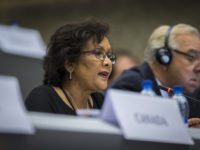Canadian Heritage Minister Melanie Joly does not plan to release her digital culture policy plan until September, but the pressure to address the financial challenges faced by media organizations increased last week with the Standing Committee on Canadian Heritage report (the same report that recommended an Internet tax that was swiftly rejected by Prime Minister Trudeau) and a proposal from News Media Canada that seeks hundreds of millions in annual government support. The recommendations don’t end there: copyright reform, tax changes, and amendments to government advertising policies are all part of the proposals to provide support to Canadian media organizations.
Andrew Coyne’s must-read column persuasively argues against a media bailout, noting the dangers of permanent government funding of an otherwise independent media. He rightly argues that if funding is established, it isn’t going away as government will be reluctant to allow funded media organizations to fail. Further, Ken Whyte, former editor-in-chief of the National Post, openly acknowledges in a Twitter stream the constraints that come from criticizing government when funding or regulation is at stake.
![Doublespeak [Explore] by Kat Northern Lights Man (CC BY-NC 2.0) https://flic.kr/p/ekXjym](https://www.michaelgeist.ca/wp-content/uploads/2017/06/8758444996_b6b5593699_h-200x150.jpg)










